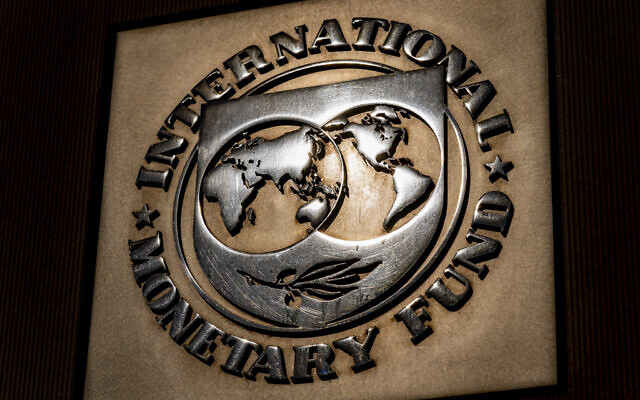Prolonged uncertainty over Israel’s judicial overhaul presents a “notable downside risk” to the country’s economy, the International Monetary Fund (IMF) on Wednesday.
“Absent the emergence of a durable and politically sustainable solution, continued uncertainty could significantly increase the price of risk in the economy, tightening financial conditions and hindering investment and consumption, with potential repercussions for growth, also in the longer term,” the IMF said in its initial country report on the Israeli economy. “Permanently lowering the uncertainty around judicial reform requires a politically sustainable solution that is clearly communicated and well understood both domestically and abroad.”
“As in any country, maintaining strength of the rule of law would be important for economic success,” it was written in the report.
The warning comes after Moody’s Investors Service said in April that the key trigger for lowering Israel’s credit rating outlook to “stable” from “positive” was concern that the planned changes to the country’s legal system would threaten the independence of the judiciary, which is crucial in particular in Israel. The agency kept the country’s actual credit rating intact at A1, citing “strong economic growth and improving fiscal strength.”
Senior executives and entrepreneurs from Israel’s business and tech community have taken to the streets in recent months to publicly voice their concern over the judicial overhaul and senior economists have repeatedly warned that the planned government moves will essentially neuter Israel’s democratic system of checks and balances and undermine the rule of law.
Following the protests, the advancement of the proposed judicial changes was paused in March to allow for negotiations between coalition and opposition representatives in an attempt to formulate broad consensus on the judicial reform.

File: The logo of the International Monetary Fund is visible on their building, Monday, April 5, 2021, in Washington. (AP Photo/Andrew Harnik)
The IMF’s initial country report was presented to Finance Minister Bezalel Smotrich and Bank of Israel Governor Amir Yaron. The IMF’s detailed annual country report will be published at a later stage.
While warning about the downside risk to Israel’s economy posed by the proposed judicial changes, the IMF commended Israel for its “remarkable” recovery from the coronavirus pandemic in 2022, which it said was based on strong fundamentals propelled by a “vibrant” high tech industry.
“Public debt-to-GDP fell rapidly to pre-COVID levels, international reserves are ample, the external position is strong, and the banking sector has adequate capital and liquidity buffers,” the IMF noted.
Looking ahead, “the outlook is for growth to slow broadly in line with its potential, as inflation falls to the targeted range by the end of 2024,” the IMF said.
The IMF cut Israel’s growth outlook for 2023 to 2.5% from 2.9% after the economy expanded by 6.4% last year. That is in line with Bank of Israel’s projections of growth of 2.5% in 2023 and 3.5% in 2024.
In early April, the OECD cautioned that the country’s pace of economic growth is expected to moderate, warning that “risks are skewed to the downside, related to high global and domestic uncertainty.” The organization sees GDP slowing to 3% in 2023 and 3.4% in 2024.

Tech workers protest against the government’s judicial overhaul ‘time is running out for Israeli hi-tech,’ in Tel Aviv, on March 23, 2023. (Avshalom Sassoni/Flash90)
Among the downside risks to growth for Israel, the IMF also cited spillovers from a weaker global economic outlook, a renewed surge in global energy prices, new supply chain disruptions, and growing geopolitical tensions.
The IMF expects the global economy to expand 2.8% this year and 3% in 2024 slowing from GDP growth of 3.4% in 2022, amid the banking system turmoil, high inflation, and tighter monetary policy.
Commenting on the IMF review, Yaron noted that the report “indicates the robust economic baseline conditions of the Israeli economy, alongside the challenges it faces, as well as the range of vital policy measures implemented by the Bank of Israel to eradicate inflation and maintain the stability and advancement of the Israeli economy.”
The IMF report praised Israel for its “prudent” fiscal management and recommended monetary policy to remain tight as inflation is still hovering around 5% and is above the government target range of between 1% to 3%.
“Fiscal policy should safeguard fiscal buffers while raising growth-enhancing spending,” the IMF said. “The fiscal stance seems adequate to preserve buffers, but additional fiscal space is needed for boosting potential growth and reducing inequality.”
The IMF recommended further education reforms and additional investment in infrastructure to ease traffic congestion and improve job accessibility which it said could boost GDP growth and reduce inequality.
Standard & Poor’s rating update
The IMF review on the Israeli economy comes ahead of Standard & Poor’s update on the country’s credit rating which is expected to be released late on Friday. Following its last review in November, S&P kept Israel’s favorable rating unchanged at AA- with a “stable” outlook, citing the country’s wealthy and resilient economy.”
In January S&P’s Global Ratings director Maxim Rybnikov told Reuters that risks to the country’s ratings are balanced, but that could change as the agency was closely watching the government moves on the advancement of the proposed judicial overhaul.
“If the announced judicial system changes set a trend for a weakening of Israel’s institutional arrangements and existing checks and balances this could in the future present downside risks to the ratings. But we are not there yet,” said Rybnikov.
Aiming to at least avert a downgrade in Israel’s credit rating outlook, Prime Minister Benjamin Netanyahu and President Isaac Herzog, who is hosting compromise talks on the overhaul, are said to have held discussions in recent days with senior S&P officials, trying to reassure the agency that legislation has been paused to reach broad agreements and will not be advanced in its original format, Calcalist reported.
“There is no shift expected in Israel’s rating outlook as the legislation on the judicial overhaul has now been frozen for one and a half month and politicians, including the prime minister have indicated that they will not pursue a unilateral move,” Jonathan Katz, chief economist at Leader Capital Markets, told The Times of Israel.
Bank Hapoalim economists expect S&P’s update on the country’s sovereign rating to focus on macroeconomic risks and the fiscal situation and less on judicial overhaul concerns.
Hapoalim forecasts zero economic growth in the coming quarters with the possibility of a contraction in Israel’s GDP. The economists cited a decline in the exports of goods in the first quarter and in the activity in the high-tech sector, as well as a slowdown in private consumption, and a drop in building starts.
Israel’s vaunted tech sector has long been touted as the main engine of Israel’s economic growth, accounting for 50% of total exports and generating around 15% of GDP in 2022.
“The decline in the high-tech sector may not be unique to Israel, but the industry’s high share of GDP is now weighing on economic growth,” Hapoalim economists wrote in a recent report. “Unlike Moody’s, it is reasonable to assume that S&P will also note the economic risks and the deterioration in the fiscal situation (…) they may place less emphasis on the risk of the judicial reform, in light of the ongoing negotiations.”
IMF says uncertainty over judicial overhaul poses ‘risks’ to Israeli economy - The Times of Israel
Read More
No comments:
Post a Comment